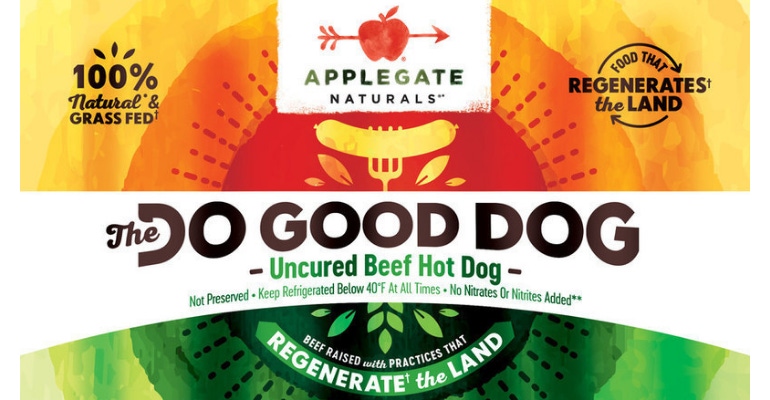Applegate’s new Do Good Dog product is made from SunFed Ranch regenerative beef that’s certified by the Savory Institute.

Fifteen years ago, Applegate launched what it called the “cleaner wiener,” an organic, grass-fed beef hot dog, with the hope of changing the way people tview the poster child for mystery meat. And this year the company is doing it again with the Do Good Dog, the first nationally available hot dog sourced from verified regenerative U.S. grasslands.
“Applegate’s goal is to take regenerative agriculture from niche to norm,” says Applegate president John Ghingo, “and we thought the best way to do that is with what is arguably one of the most recognizable, familiar foods: the humble hot dog.”
The Do Good Dog is made with beef sourced from SunFed Ranch and certified by the Savory Institute’s Land to Market seal, a certification that measures soil health, biodiversity, water retention and other ecosystem services. Still, many say that regenerative beef cannot be scaled.
Ghingo’s response? “Thirty years ago, there was no market for meat produced with no antibiotics; now it’s a $3 billion market,” he says. “Applegate led the way to build the market by educating consumers, bringing on skeptical farmers and working with partners to advance the movement. At this critical moment, we are committed to doing the same with regenerative.”
That’s not to say this launch has been without its challenges. Applegate’s biggest need was having enough supply to make the product nationally available, and making sure that supply met core brand values like high animal welfare. Not only are the farmers at SunFed Ranch aligned with Applegate’s mission, but the partnership is helping both brands change the system for the better.
“By working with SunFed Ranch to produce the Do Good Dog, Applegate is helping to support the regeneration of up to 260,000 acres of U.S. grasslands, making it one of the largest verified systems for regeneratively sourced beef,” Ghingo says. “And, by working with us, SunFed Ranch has been able to double its grass fed cattle production, which will help them achieve their goal to become 100% carbon neutral by 2024.”
But it will take a lot more to scale regenerative beef across the board, and across many farms and brands. First, says Ghingo, it will take the know-how to build a very specialized supply chain and bring the right partners together, including brands, farmers and certifiers. But it will also take a commitment to transparency, in order to educate consumers and build confidence in the process of regeneration as well as the final product on the shelf.
“That’s why our work with SunFed Ranch and the Savory Institute is so important—they are working together to measure outcomes, ensuring that the ranch that the beef for the Do Good Dog is coming from is progressively improving soil health, biodiversity and ecosystem functions, such as water retention or erosion reduction,” Ghingo says. “With the Savory Institute’s Land to Market Seal, we can give consumers the confidence that the product they are holding in their hands came from a system that is proven to regenerate land.”
About the Author(s)
You May Also Like


